Abstract
A tumor-associated transplantation antigen with an apparent molecular weight of 75,000 has been isolated from the cytosol of the BALB/c methylcholanthrene-induced sarcoma, Meth A. The antigen was purified either by preparative electrophoresis in the presence of NaDodSO4 or by immunoaffinity chromatography after hexylamine agarose chromatography, gel filtration, and hydroxylapatite chromatography. The 75-kilodalton (kDal) protein prepared by either of these methods effectively primed BALB/c mice to reject the Meth A tumor; such priming provided no protection against challenge by other independently derived sarcomas of BALB/c origin. A second protein, also 75 kDal, was isolated from the cytosol of the recently derived methylcholanthrene-induced sarcoma CI-4 by essentially the same chromatographic scheme. This protein also was immunogenic in the tumor rejection assay and provided protection only against CI-4 challenge. The antigens purified from the Meth A and CI-4 sarcomas appear to be closely related proteins. Both of them can be purified from the cytosol fraction and can be recognized by a rabbit antiserum prepared against the Meth A 75-kDal protein. The two proteins have approximately the same molecular weight, have similar but not identical amino acid compositions, and differ in their chromatographic behavior on hexylamine agarose and hydroxylapatite as well as in their isoelectric points. These results indicate that the individually specific transplantation antigens found in chemically induced sarcomas may be the products of a single multigene family or somatic derivatives of a single gene.
Full text
PDF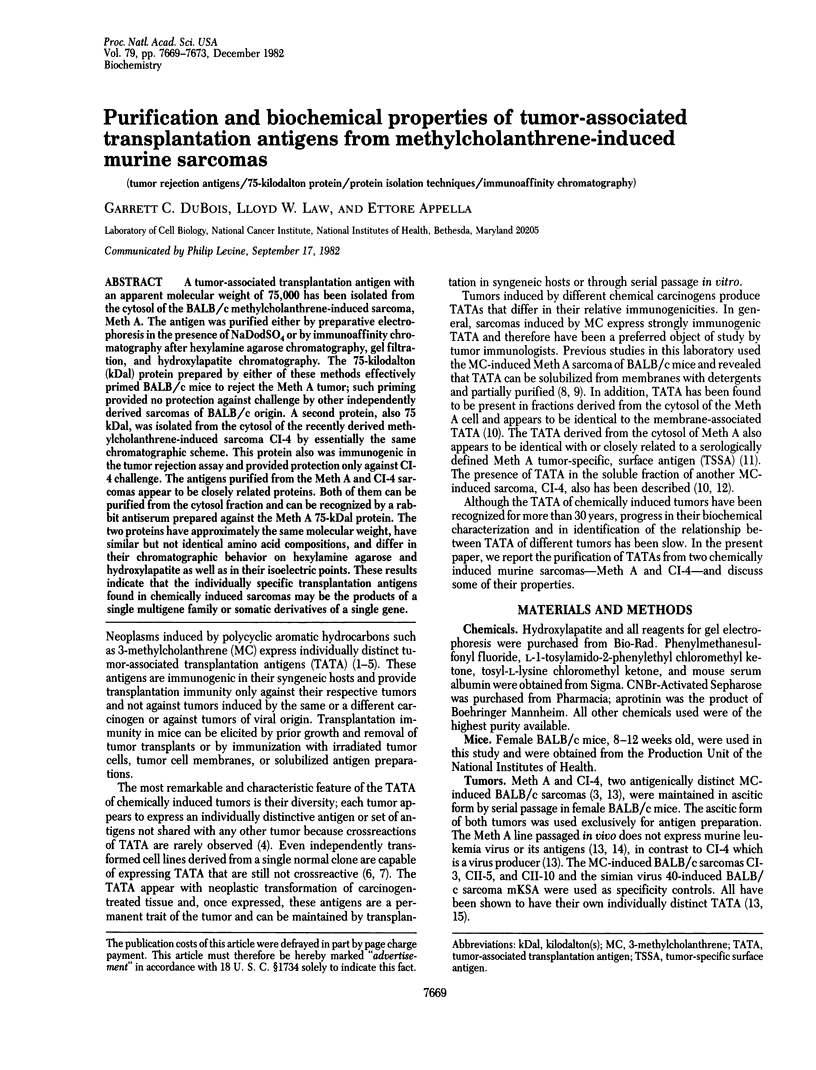
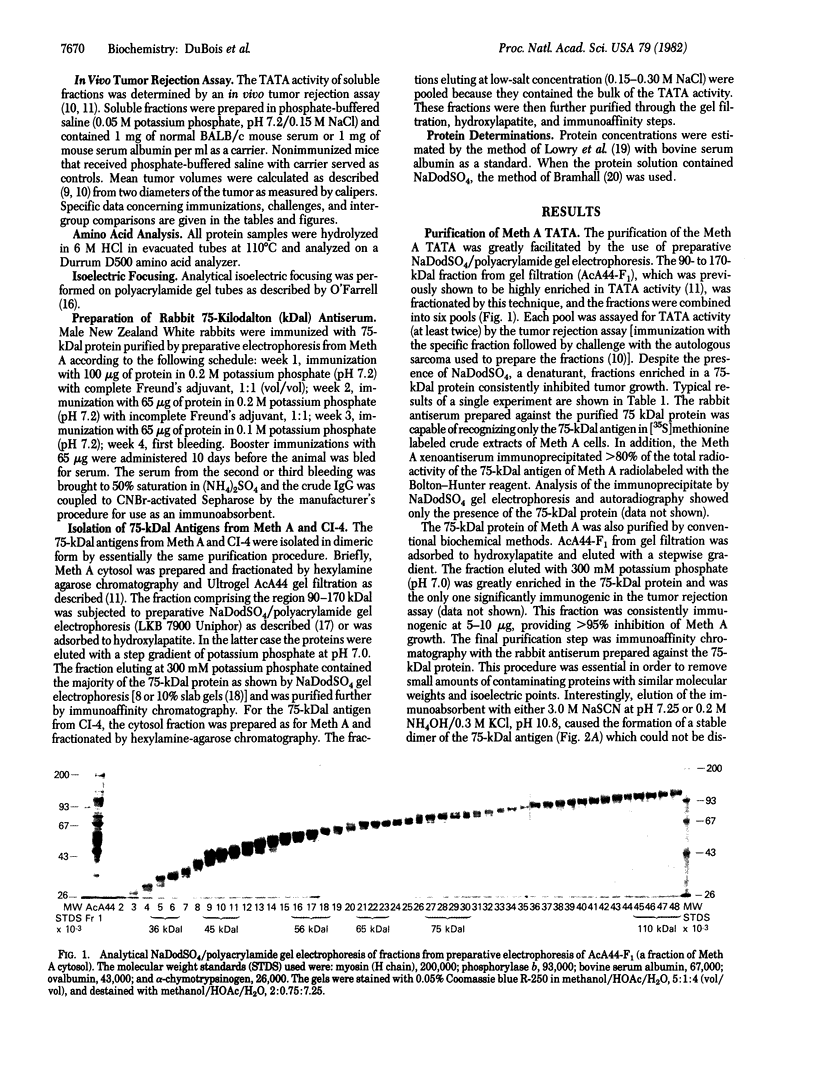
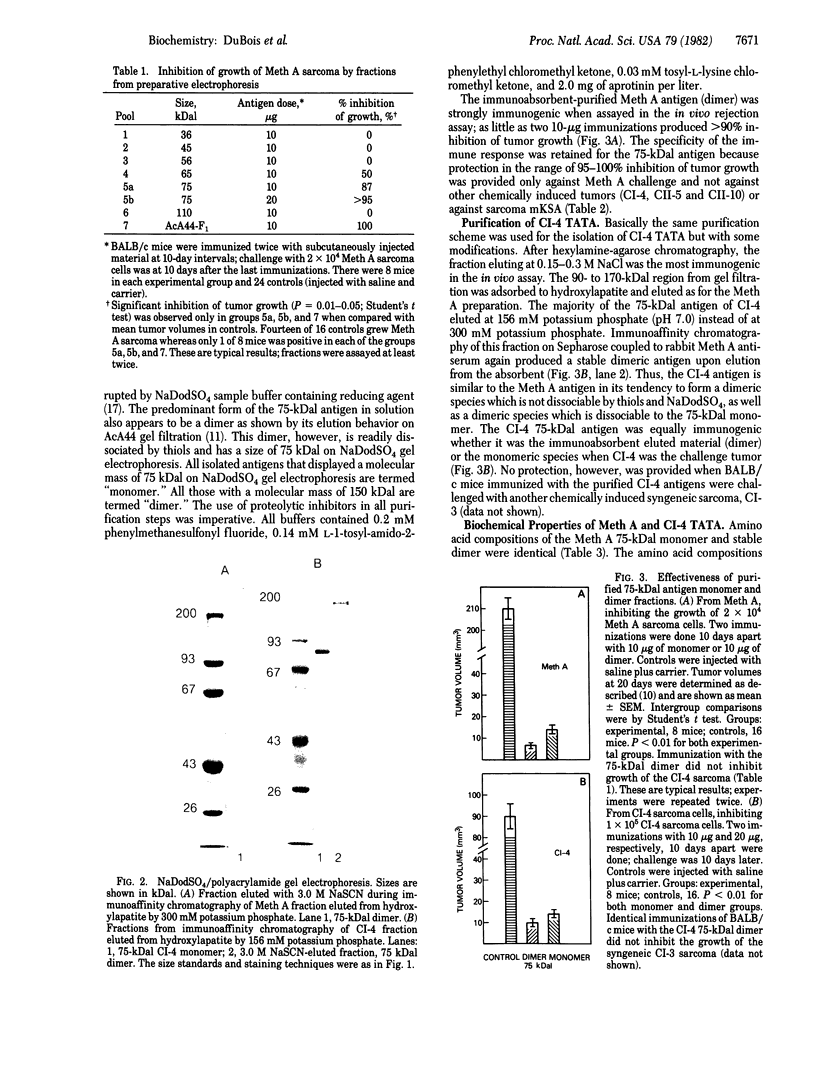
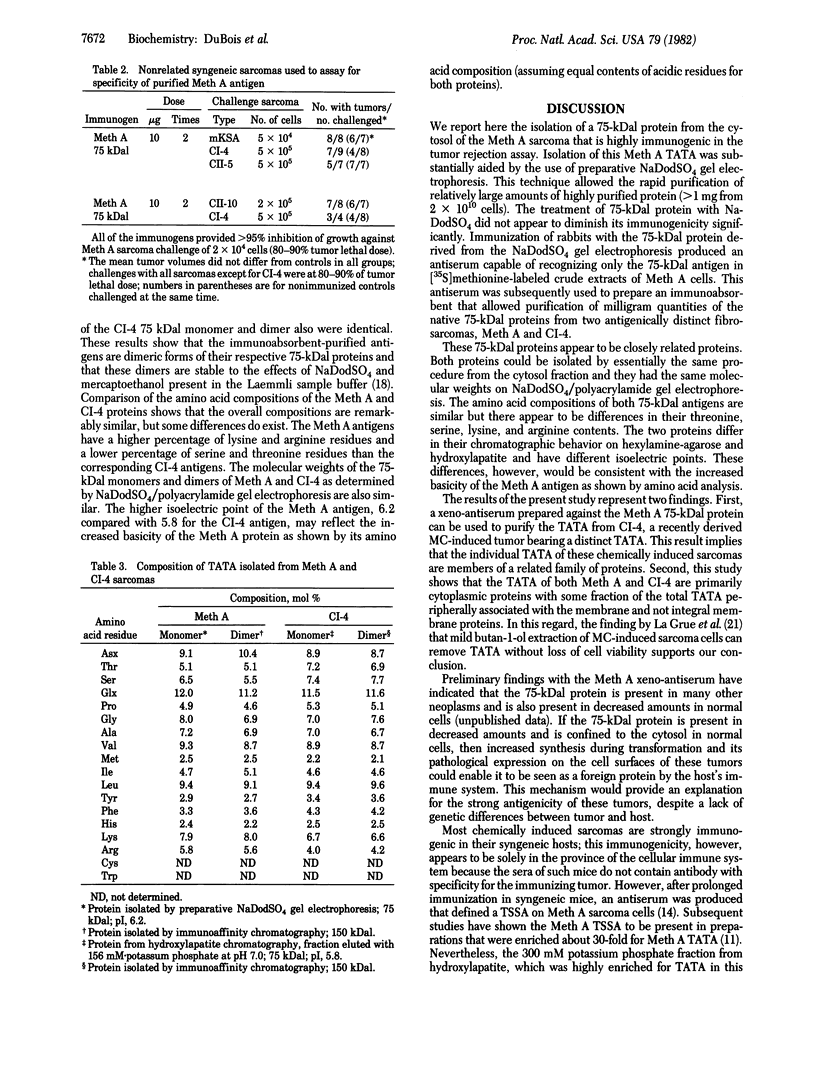
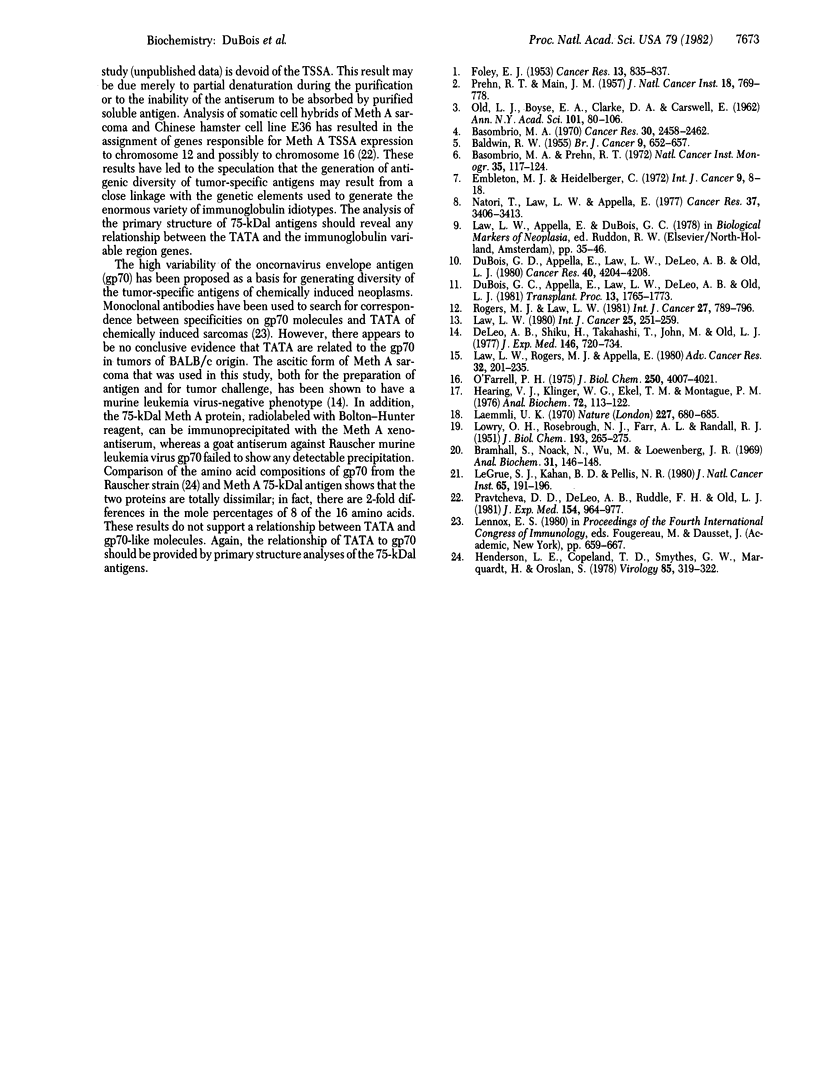
Images in this article
Selected References
These references are in PubMed. This may not be the complete list of references from this article.
- BALDWIN R. W. Immunity to methylcholanthrene-induced tumours in inbred rats following atrophy and regression of the implanted tumours. Br J Cancer. 1955 Dec;9(4):652–657. doi: 10.1038/bjc.1955.70. [DOI] [PMC free article] [PubMed] [Google Scholar]
- Basombrío M. A., Prehn R. T. Studies on the basis for diversity and time of appearance of antigens in chemically induced tumors. Natl Cancer Inst Monogr. 1972 Dec;35:117–124. [PubMed] [Google Scholar]
- Basombrío M. A. Search for common antigenicities among twenty-five sarcomas induced by methylcholanthrene. Cancer Res. 1970 Oct;30(10):2458–2462. [PubMed] [Google Scholar]
- Bramhall S., Noack N., Wu M., Loewenberg J. R. A simple colorimetric method for determination of protein. Anal Biochem. 1969 Oct 1;31(1):146–148. doi: 10.1016/0003-2697(69)90251-6. [DOI] [PubMed] [Google Scholar]
- DeLeo A. B., Shiku H., Takahashi T., John M., Old L. J. Cell surface antigens of chemically induced sarcomas of the mouse. I. Murine leukemia virus-related antigens and alloantigens on cultured fibroblasts and sarcoma cells: description of a unique antigen on BALB/c Meth A sarcoma. J Exp Med. 1977 Sep 1;146(3):720–734. doi: 10.1084/jem.146.3.720. [DOI] [PMC free article] [PubMed] [Google Scholar]
- DuBois G. C., Appella E., Law L. W., DeLeo A. B., Old L. J. Immunogenic properties of soluble cytosol fractions on Meth A sarcoma cells. Cancer Res. 1980 Nov;40(11):4204–4208. [PubMed] [Google Scholar]
- DuBois G. C., Appella E., Law L. W., DeLeo A. B., Old L. J. The soluble antigens of BALB/c sarcoma Meth-A: a relationship between a serologically defined tumor-specific surface antigen (TSSA) and the tumor-associated transplantation antigen (TATA). Transplant Proc. 1981 Dec;13(4):1765–1773. [PubMed] [Google Scholar]
- FOLEY E. J. Antigenic properties of methylcholanthrene-induced tumors in mice of the strain of origin. Cancer Res. 1953 Dec;13(12):835–837. [PubMed] [Google Scholar]
- Hearing V. J., Klingler W. G., Ekel T. M., Montague P. M. Molecular weight estimation of Triton X-100 solubilized proteins by polyacrylamide gel electrophoresis. Anal Biochem. 1976 May 7;72:113–122. doi: 10.1016/0003-2697(76)90512-1. [DOI] [PubMed] [Google Scholar]
- Henderson L. E., Copeland T. D., Smythers G. W., Marquardt H., Oroszlan S. Amino-terminal amino acid sequence and carboxyl-terminal analysis of Rauscher murine leukemia virus glycoproteins. Virology. 1978 Mar;85(1):319–322. doi: 10.1016/0042-6822(78)90437-3. [DOI] [PubMed] [Google Scholar]
- LOWRY O. H., ROSEBROUGH N. J., FARR A. L., RANDALL R. J. Protein measurement with the Folin phenol reagent. J Biol Chem. 1951 Nov;193(1):265–275. [PubMed] [Google Scholar]
- Laemmli U. K. Cleavage of structural proteins during the assembly of the head of bacteriophage T4. Nature. 1970 Aug 15;227(5259):680–685. doi: 10.1038/227680a0. [DOI] [PubMed] [Google Scholar]
- Law L. W. Changes in tumor-specific antigen expression during passage in vitro and in vivo of newly derived methylcholanthrene-induced sarcomas of BALB/C mice. Int J Cancer. 1980 Feb 15;25(2):251–259. doi: 10.1002/ijc.2910250213. [DOI] [PubMed] [Google Scholar]
- Law L. W., Rogers M. J., Appella E. Tumor antigens on neoplasms induced by chemical carcinogens and by DNA- and RNA-containing viruses: properties of the solubilized antigens. Adv Cancer Res. 1980;32:201–235. doi: 10.1016/s0065-230x(08)60362-0. [DOI] [PubMed] [Google Scholar]
- LeGrue S. J., Kahan B. D., Pellis N. R. Extraction of a murine tumor-specific transplantation antigen with 1-butanol. I. Partial purification by isoelectric focusing. J Natl Cancer Inst. 1980 Jul;65(1):191–196. [PubMed] [Google Scholar]
- Natori T., Law L. W., Appella E. Biological and biochemical properties of Nonidet P40-solubilized and partially purified tumor-specific antigens of the transplantation type from plasma membranes of a methylcholanthrene-induced sarcoma. Cancer Res. 1977 Sep;37(9):3406–3413. [PubMed] [Google Scholar]
- O'Farrell P. H. High resolution two-dimensional electrophoresis of proteins. J Biol Chem. 1975 May 25;250(10):4007–4021. [PMC free article] [PubMed] [Google Scholar]
- PREHN R. T., MAIN J. M. Immunity to methylcholanthrene-induced sarcomas. J Natl Cancer Inst. 1957 Jun;18(6):769–778. [PubMed] [Google Scholar]
- Pravtcheva D. D., DeLeo A. B., Ruddle F. H., Old L. J. Chromosome assignment of the tumor-specific antigen of a 3-methylcholanthrene-induced mouse sarcoma. J Exp Med. 1981 Sep 1;154(3):964–977. doi: 10.1084/jem.154.3.964. [DOI] [PMC free article] [PubMed] [Google Scholar]
- Rogers M. J., Law L. W. Some immunogenic acid biochemical properties of tumor-associated transplantation antigens (TATA) obtained in soluble form or solubilized from two methylcholanthrene-induced sarcomas, Meth A and CI-4. Int J Cancer. 1981 Jun 15;27(6):789–796. doi: 10.1002/ijc.2910270610. [DOI] [PubMed] [Google Scholar]





